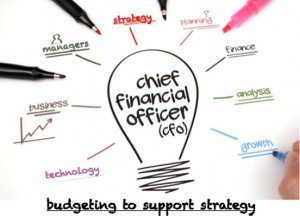The following article draws from, and expands on, an article entitled “How CFO’s Have Evolved From Bookkeeping into Corporate Leaders” by David Dewolf
The CFO’s role is changing for the good. A recent Entrepreneur article by David DeWolf, captured the essence of this new kind of leader. The days of old CFO’s who try to drive the car by looking in the rear-view mirror appear to be over. In today’s world the CFO must make the finance function (and his or her own role) more strategic to the organization. The role has expanded.
DeWolf eloquently describes what is perhaps the most important element of this CFO’s new role as the “CEO’s right-hand executive.” He explains:
“Today’s CFO is the CEO’s confidant and enthusiastic champion and the number one person to ensure of strategy execution and funding. He or she is a sounding board and collaborator on everything from financial performance to strategy. While the contemporary CFO shares certain values and ideals with the CEO, he or she must think differently enough to provide an alternative perspective.
Additionally, the contemporary CFO lives, breathes and puts into action the CEO’s corporate vision. The individual understands the importance of culture, brand and strategy, and works actively with the team to justify investments. Having an EQ (emotional intelligence) as strong as their IQ, the contemporary CFO is in tune with the culture of the organization. He or she understands the importance of momentum for the organization to reach its full potential.”
We would go so far as to add that as such, the new CFO’s role is to help make sure that the entire organization supports and budgets to the CEO’s vision and strategy. As we all know, ensuring buy-in across an organization is no small feat – and in this new role, the CFO is part counselor, part ringmaster, part cat-herder, and full time navigator. DeWolf describes this as “Strategic Advisor” meets “Disciplined Operator”…
“Strategic advisor. The contemporary CFO is the senior executive team’s on-staff advisor. The person understands, in depth, the market opportunity, strategy and business model of the organization and provides a unique perspective that looks across all departments.
Besides the CEO, the contemporary CFO is the only person with a clear view of the big picture and limited bias toward one aspect of its performance. To play this advisory role well, the individual is a business executive first and a financial executive second. They need a strong grounding in accounting and finance but that is simply a given in business today.”
“Disciplined operator. Today’s CFO provides data, information, insights and puts them into action. The contemporary CFO understands how to build scalable systems and processes. The individual develops KPIs and understands performance trends, but also develops and implements strategies to improve them.
To excel, the contemporary CFO must move away from the financial report card and embrace business insights. For the CFO, historical performance has been overtaken by trend recognition, forecasting and key performance indicators, and business and operating plans of the future. To ensure success, today’s CFO must speak the language of business and understand that the key drivers of business are often significantly more than what shows up on the balance sheet”
And of course – ensuring that the key drivers are understood involves more than guesswork or yesterday’s tools and solutions. The CFO must invest to make sure that the proper tools are in place to help department managers build and justify budgets that support the strategic plan. This requires an overall improvement to the entire budgeting and forecasting process. DeWolf goes further to explain that the CFO with an eye towards “tomorrow” is an “innovative technologist”…
“Tomorrow’s CFO drives innovative technology solutions in support of the business. Tomorrow’s CFO embraces the “product mindset” that products need to be engaging, delightful to use, deliver the stated business outcome and continually evolve. They understand that the consumerization of software has dramatically raised the bar. To empower employees to excel, the technology itself must get out of the way.
An educated consumer of technology, tomorrow’s CFO pushes the envelope, demanding creative solutions that empower employees. They are dangerous enough to know what to ask for and educated enough to know what is possible.
Of course, there are legal, regulatory and financial items that are necessary for today’s CFO to understand, but the contemporary CFO is, above all, a leader. He or she knows how to manage the status quo while always pushing the organization forward. The contemporary CFO demonstrates this first and foremost in the evolution of his or her own role.”
Based on our experience working with leading CFO’s who embrace this new world of financial leadership we’ve gathered a few key rules for success. In order to fund strategy, get the appropriate buy-in from the department heads, improve the forecasting process, and improve the financial performance of the organization, this “new” CFO must do the following:
- Recognize budgeting as a mission critical function inside the organization
- Provide department heads with an inviting and simplistic user experience in the budget process as well as the flexibility to budget their areas the way they think about their areas
- Allow department heads a communication vehicle that allows them to justify their expenses and explain how they are supporting the CEO’s strategy and vision and prevent budgeting simply to history and politics
- Have a built-in budget review and approval process to ensure an overall proper review of the final product
- Commit to a technology advance that gets the organization out of silly, limiting, and error-prone, two-dimensional budgeting.
- Increase the ease and flexibility in the forecasting process to keep the numbers and perspective fresh
- Provide for an easy way to answer questions about the budget
- Provide a simple way to test assumptions through pragmatic “what-if” scenarios
Because, as DeWolf so concisely concludes: “Your business can’t afford not to have a contemporary CFO. The days of tending the ship are over.”


